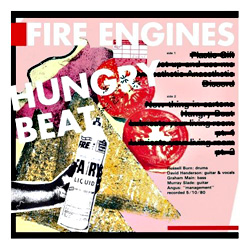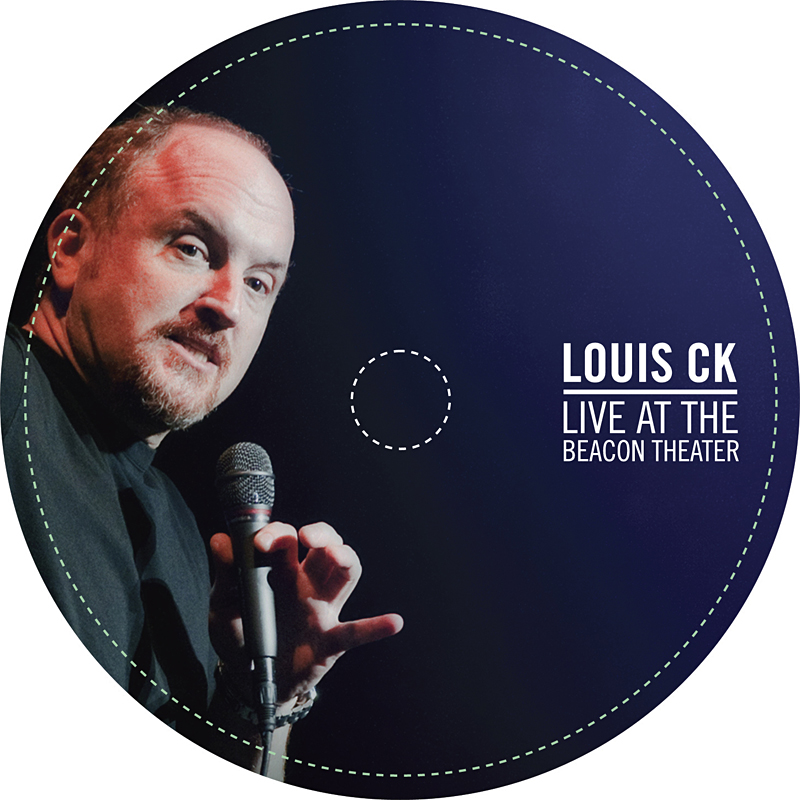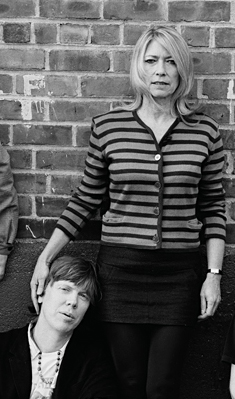Wooden Shjips
Wooden Shjips
(Holy Mountain)
In the hands of a lesser band, Moe Tucker–esque repetitive drumming, Mercury Rev–like keys, squalls of psych guitar, and vocals buried under a flood of echo have the power to drive people away. But when Wooden Shjips tests these elements in a live setting, everyone hugs the stage tightly. These guys set SXSW ablaze with their narcotic jams, the kind of Velvets-inspired tunes that get the few major-label A&R reps with good taste fired up, even though they’d never get the green light to sign the band. Even Rolling Stone staple David Fricke rocked back and forth on his heels, looking pleased beneath his Joey Ramone bangs.
The anticipation surrounding Wooden Shjips, a group of older San Francisco longhairs, has been building since the 2006 release of their two very underground 10-inch EPs (which they mostly gave away for free) and their vinyl single, “Dance, California,” last year. Those releases were concentrated freak-outs, the kind of jams that mixed tightly wound meditation-rock, Sir Douglas Quintet blues-shake, and deconstructionist Lou Reed solos circa White Light/White Heat. It was like Comets on Fire without the cocaine sprinkled on the weed.
Now comes Wooden Shjips’ full-length debut on Holy Mountain, a label nearly flawless in its reputation for handling stuff like this (it is responsible for early works of like-minded artists Om and Six Organs of Admittance). The self-titled release is a very focused effort—something tells me the band wanted to deal in atmospherics and make an album. Instead of immediately spraying your ears with a blast of lysergic noise, the album opens with restrained, proglike drumming, followed by a two-note keyboard drone that drags you deep into the record’s grooves. Frontman Ripley Johnson’s vocals, normally caught up in a reverb current, are front and center, sounding like Jim Morrison when he’d do that lips-pressed-against-microphone-poet-whisper thing with just a touch of echo effect.
It’s a slow ride at first, but at 1:38 into the first track, Johnson unleashes a guitar solo that’s pretty much all screeching feedback—and you’re in it for the long haul. Johnson is careful with the notes he plays, allowing the few he chooses to ring out in waves of reverb. “Losin’ Time,” the album’s second number, has the sort of meaty slabs of fuzz that make Shjips fanatics drool, but it’s the fourth track, “Blue Sky Bends,” that’s the real stunner, a lengthy number on which Johnson’s out-there guitar speaks three languages: the distorto-avant crunch of Neil Young’s Arc, the droney bliss of Les Rallizes Denude, and ’70s-era Jerry Garcia, when his “Dark Star” solos sounded like Sonic Youth covering Miles Davis.
The album ends with a 10-minute burner called “Shine Like Suns.” The drums are as slow as a ticking clock, the vocals indecipherable, and the rattle of bells trance-inducing. The song’s effect is purely physical, in the way bands like SunnO))) and Earth are. But Wooden Shjips don’t deal in doom, they deal in bliss—and you can feel it. Their vibe is singularly Californian, as if the good times of the Avalon Ballroom era run in their blood. My only hope is that when they do play Seattle, they bring a super-trippy light show.
Fire Engines
Hungry Beat
(Domino)
Writing about the Fire Engines is a lot of fun. The music of these relatively unknown Scots lends itself to all sorts of comparisons to tangible objects: guitar solos that grind like corkscrews, uptight backbeats that perform frantic backbends, solos that are as frayed as exposed high-tension wires. Their heyday was a quick 18 months during 1980 and 1981. But unlike the indie pop sprouting up in their country at the time, the Fire Engines were as cranky as the Fall, as joyful as Beefheart, as charming as they were antagonistic. Yet, like Wire or Gang of Four, you could probably still dance to the Engines—though you’d likely wind up looking like a handicapped Devo if you did.
Thanks to Franz Ferdinand, whose cover of the Engines’ “Get Up and Use Me” renewed interest in the band, we’ve been treated to two albums of material the band never released in its prime: last year’s Codex Teenage Premonition and this year’s Hungry Beat. Codex was a collection of live material and demos, which, if it were one’s first exposure to the band, would be a harsh listen for all of its spastic messiness and no production. Hungry Beat, however, collects the long out-of-print EPs they released on the Fast Product-Pop Aural label. Most of these tracks suggest a band too high on sugar to contain its energy.
But for all their angularity, the Fire Engines could also be funky, albeit a razor-sharp funky. While the disco-punk fad has passed, the Fire Engines are a palate cleanser for anyone who developed a distaste for it over the past few years. Ultimately, Hungry Beat seems to be part of a slow trickle of what will finally be the reissue of the entire Fire Engines catalog. I can only imagine that their lone studio LP, Lubricate Your Living Room, will soon follow.








